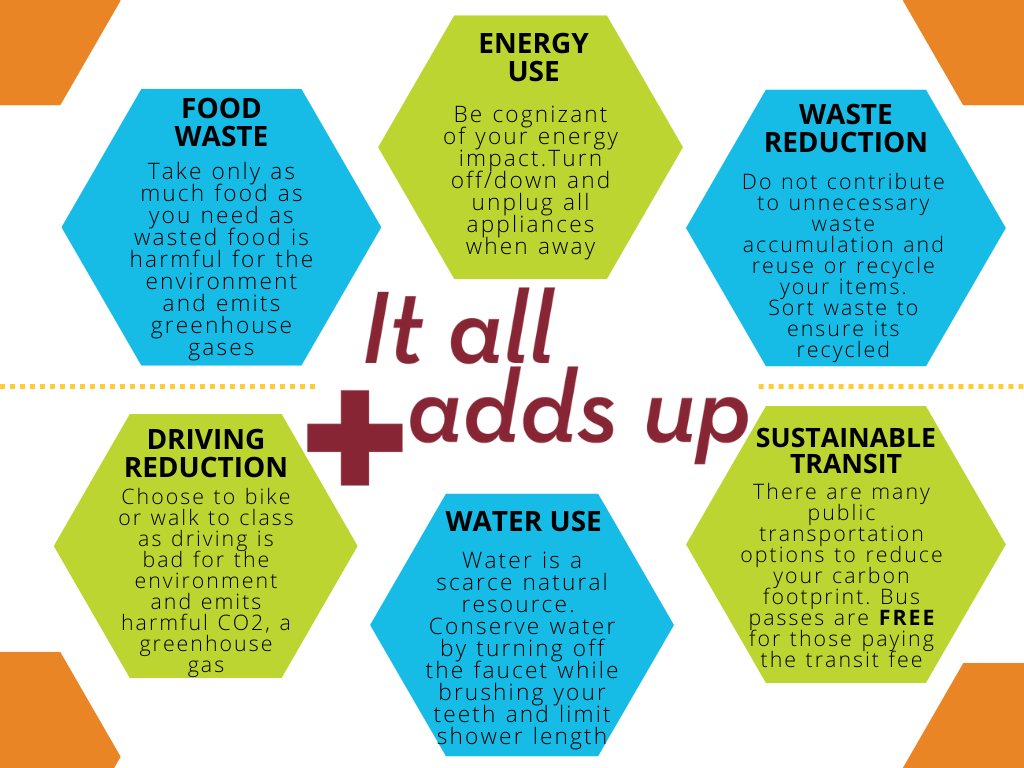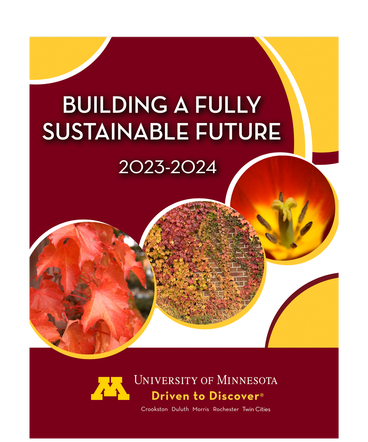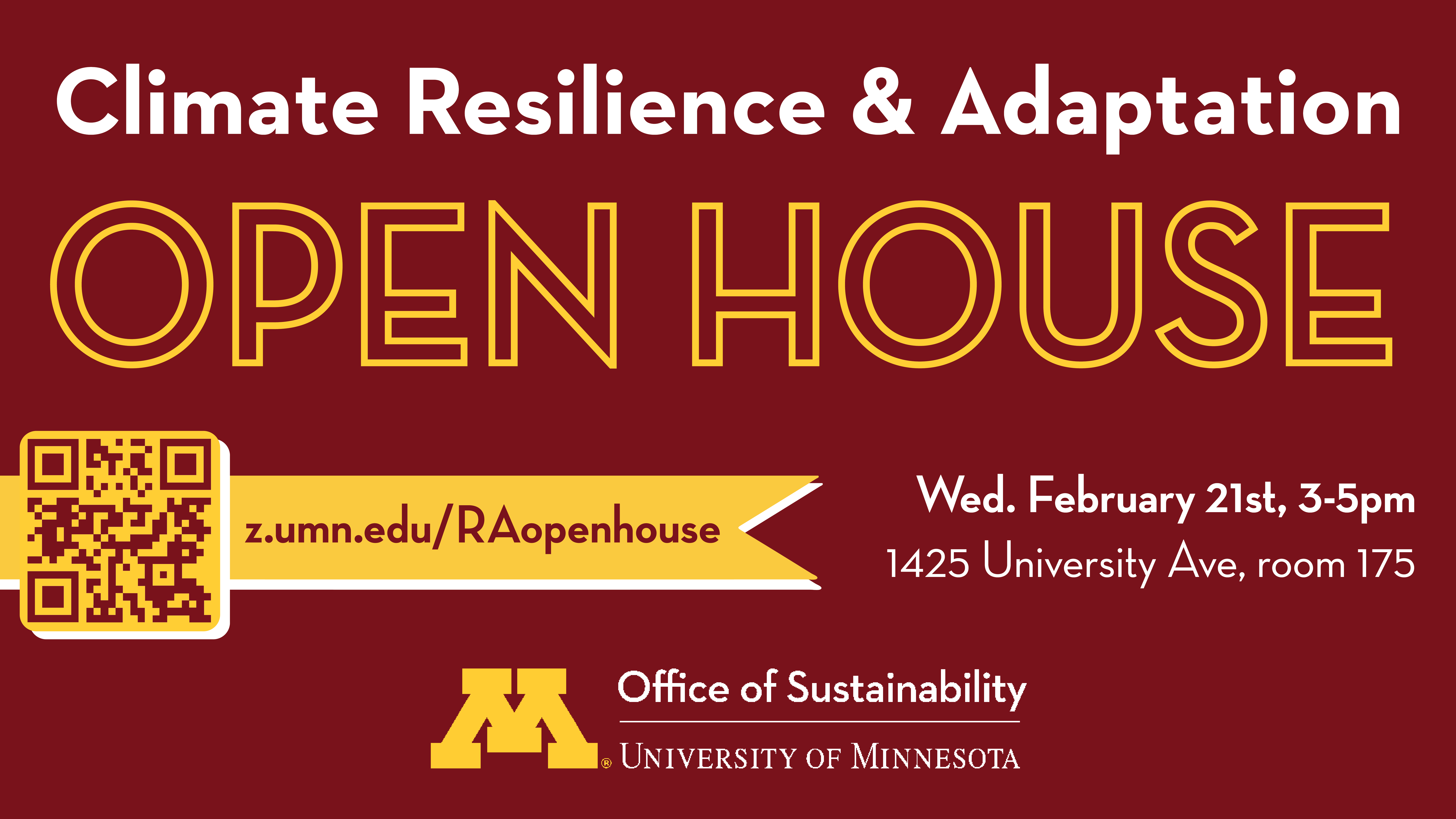
Ever wonder how to be sustainable on and off campus?There are various ways and engagement levels to lead a sustainable lifestyle on and off campus!
For those living on campus:
- Be cognizant of your energy impact and turn off/unplug all appliances and lights when not in your dorm.
- Turn heat and air conditioning off/down when you're away.
- Take the stairs over the elevator.
Turning off lights, heat, air conditioning, and other appliances when not in use or when you're not in your room, can help reduce your energy consumption and carbon footprint. Choosing to take the stairs over using the elevator, if you are able, is another way to reduce your energy consumption. All forms of electricity generation have an environmental impact on our air, water, and land. Environmental problems directly related to energy consumption and production include air pollution, climate change, water pollution, thermal pollution and solid waste disposal. So, reducing your use of electricity will reduce this impact on the environment. Learn about Energy and its Impact on the Environment | US EPA. The University has great Clean Energy and Energy Efficiency initiatives to achieve electricity savings, energy efficiency, energy savings, and is dedicated to increasing renewable energy.
- Take only as much food as you will eat
Some dining halls may be buffet style which may prompt you to take more food than you can actually eat, so start small and work your way up. You can always go back for seconds (or thirds) but you cannot put the food back on the buffet once it's on your plate. Though the University’s dining service M Food Co.'s vendor, Chartwells, measures food waste daily to try to reduce food waste, it is up to you to try to reduce your individual waste. Food waste is an environmental problem. Not only is the food wasted, but all the inputs, energy, water, land, labor etc. that it takes to grow, harvest, transport, and package the food are also wasted. Additionally, food and other organic material is composted to divert it from ending up as trash in landfills. As food goes to landfills and rots, it produces methane, a more potent greenhouse gas than carbon dioxide. Therefore, reduce your own contribution to food waste by only taking what you need and being cognizant of the environmental impacts.
- Turn off the faucet while brushing your teeth and limit shower length
Water conservation means using your water resources wisely and not contributing to unnecessary waste. Reducing your water consumption has positive environmental impacts, as water use has a carbon footprint. Using less water in your individual life allows for more water to be in our ecosystems and keeps our wetland habitats healthy for wildlife. Reducing water consumption lowers energy demand which helps prevent air pollution, minimizes effects of drought and water shortages, and overall preserves our environment. Every drop counts! Cutting your shower time by just one minute can save 2.1 gallons of water. The University collects and reuses about 5 million gallons of rainwater each year to provide water in multiple locations on campus.
- Bike to class
- Use public transportation
Biking and walking to class instead of driving is not only better for your personal health, but also for the health of the environment! Biking keeps you healthy and decreases the amount of CO2 released into the air from driving your car. The less excess of CO2 the better, as it contributes to global warming and climate change. Further, reducing the amount of miles you drive is the BEST way to reduce air pollution from cars. If you can, bike or walk to class and other destinations to emit zero pollutants. Biking and walking on campus is easier than driving as there are 46 miles of sidewalks and over 12 miles of on and off-campus dedicated bike lanes and paths. There are various bike programs like ZAP Bike Program, The Hub Bike Center, and Nice Ride bike sharing that are available. Utilize public transportation! UMN Twin Cities has extensive public transportation options to reduce your carbon footprint. UMN buses and Metro Transit buses pass through campus which is a convenient way to get to class. Campus and Metro Transit buses are FREE for students who pay the transportation fee!
- Reduce waste by reusing or composting items
- Sort your waste to ensure it is recycled!
Do not contribute to unnecessary waste accumulation and purchase reusable items over disposables. Using reusable or recyclable items is a great way for you to take action and reduce excess waste. Composting is the natural process of recycling organic matter into a valuable fertilizer that can enrich soil and plants. Composting reduces the waste stream, cuts methane emissions from landfills, improves soil health, conserves water, and reduces personal food waste! The University has many goals, programs, and recycling opportunities to reduce waste that enters the trash. The University’s long term goal is to divert 90% of campus waste from entering the trash and landfills. To do this, all waste generated on campus must be reusable, recyclable, or compostable. The ReUse Program collects surplus items and makes them available for purchase. Recycling at the U provides information on what can be recycled and how to go about recycling. Sorting your waste on campus helps to ensure what should be recycled can be recycled.
- Join various clubs, organizations, or take part in our sustainability initiatives and programs
There are many student organizations and groups on campus that meet regularly, host events, and build a community of like minded students. The Environmental Student Association, UMN Energy Club, Sustainable Systems Management Club and many others are a way to learn more and take action to live a more sustainable lifestyle!
Sources:
Sustainability Tips: It All Adds Up
Sustainable Campus
environmental impact of energy — European Environment Agency
Fight climate change by preventing food waste | Stories | WWF.
How to conserve water | The Wildlife Trusts.
Reducing air pollution from cars.



